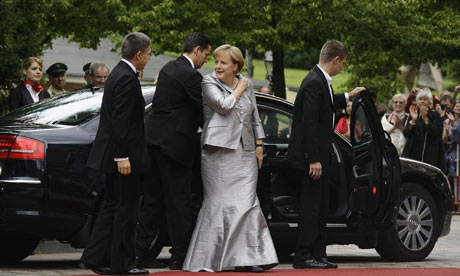The state of Bavaria has just published in a press release the names of prominent persons who have been invited, mostly on free tickets, o appear at this year’s opening night of the Bayreuth Festival on July 25.
Top ticket, as ever, is the German Chancellor Angela Merkel.

photo: guardian.co.uk
Next up are the new head of the International Monetary Fund, Christine Lagarde (never snapped there before) and the European Central Bank President Jean-Claude Trichet. Guess they can talk Rhine gold in the interval (actually, the show is Tannhäuser, so it may not be appropriate).

The European Commissioner for Health and Consumer Policy John Dalli will be there on a freebie – don’t ask me why – along with the ambassadors of the United States of America, Great Britain, France, Japan and South Korea.
Seven other German Cabinet ministers, together with Cabinet spokesman. The entire Cabinet of Bavaria and the heads of five political parties, along with various secretaries of state. Plus the Roman Catholic and Lutheran Archbishops of Bamberg. No nudity on the first night, then. Jist the odd hint of incest.
Here‘s the full list.

Slipped Disc has slipped a few spots in the monthly UK rankings complied by Wikio, published next Monday.
That’s a slight surprise since user numbers have doubled in the past half-year. But it remains by some margin the highest ranked claisscal music blog, followed by Tom Service, intermezzo and Entartete Musik. Why not browse them all?
1 Musicrooms.net
2 SoulCulture.co.uk
3 Alter The Press!
4 Lil Wayne HQ
5 St. Peter’s View
6 Dance Without Sleeping
7 Live4ever – The Brit Rock Daily
8 Matrixsynth
9 LondonJazz
10 Sweeping The Nation
11 Word Magazine blogs
12 Slipped disc
13 We Plug G.O.O.D Music
14 Song, by Toad
15 No Rock And Roll Fun
16 Tom Service on classical music
17 We Are Pop Slags
18 Intermezzo
19 We Plug G.O.O.D Music
20 Entartete Musik
The Munich company is heading to Tokyo, severely depleted. Eighty members of the 400-strong ensemble have refused to make the trip, citing radiation fears. Jonas Kaufmann (below), who pulled out of the Met trip to Japan, will sing Lohengrin. Not one of the soloists has cancelled.

The defectors have been replaced by freelance musicians and penalised with one month’s unpaid leave.
Director Nikolaus Bachler said: ‘This company has received so much from Japan over the past 40, 50 years, so much enthusiasm, so much money, that I find it an extreme act of non-solidarity with withdraw from the tour. Fear is irrational, so I allowed those who wanted to pull out.’
Sensible man.
The editor of Standpoint, Daniel Johnson, asked me to write a long essay on the present state of the symphony orchestra, more than half expecting that I would tend towards a process of neo-liberal rationalisation – fewer but better.

To my mind, though, there is no general solution. The art has to be seen within specific geographic traditions. What’s happening in America today is an American orchestral problem, Europe will have its own route to follow and as for China…. well, read on.
Here’s a pull-quote.
In a lifestyle of wall-to-wall wi-fi and instant tweets, the concert hall is one of the few places where we become reachable, where we can switch off our lifelines and surrender to a form that will not let us go for an hour or more. The symphony orchestra is our relief from the communicative addiction. It forces us, willy-nilly, to resist the responsive urge. It is a cold-turkey cure for our reactive insanity, our self-destroying restlessness.The more concerts I attend, the more I see how they restore balance to over-busy lives. It may well be that we, as a society, need the symphony orchestra now more than ever before. How we pay for it will have to be reconfigured over the next two or three difficult years
And here‘s the full 2,500-word article.
Els Swaab, head of the Raad van Cultuur, has decided she can’t take it any more. Or maybe she just can’t take the preening minister, Halbe Zijlstra. This picture in today’s papers seems to say it all.

Here‘s the first report of her resignation (in Dutch, Google translates quite well).
The response from Seattle to the announcement that its new music director, Ludovic Morlot, will job-share with La Monnaie in Brussels has been decidedly mixed.
Soe want to hold the Frenchman to his promise to spend his whole life beside the Pacific. Other heave a sigh of relief that their incoming French maestro will not be another petit Napoleon.

The last man hung around for 26 years, and for many musicians that was 20 too long, despite – or perhaps because of – the loyalty pledges they were obliged to sign. Here‘s a powerful inside view from Marjorie Kransberg-Talvi.

It was the most powerful judging panel ever assembled, a panoply of past winners from many countries. The competition was entirely transparent, shown live on the internet, heavily tweeted and facebooked, safeguarded against party and personal manipulation.
Any scandals were out in the open, not covered up. Valery Gergiev and Richard Rodzinski made the 14th Tchaikovsky competition a model of what such contests should be. Indeed, it’s unlikely music competitions will ever be the same again.
And the result? A Russian victory, again, in all the instrumental sections.
Any which way you look at it, the Russians won.
Piano: gold – Daniil Trifonov.
Violin: gold withheld. Joint silver – Sergei Dogadin and Itamar Zorman, the latter from Israel, where Russian musical influence prevails (he was a pupil of Hagai Shaham and Nava Milo).

Cello: Narek Hakhnazaryan, an Armenian, product of the Soviet education system.
What are we to deduce from this? That the Russian teaching method is superior to all others? Your view, please….








